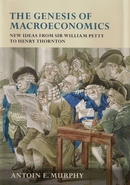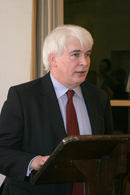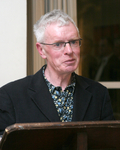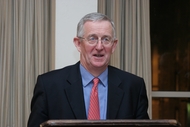'Prof Murphy's work speaks for itself: he is one of the foremost international historians of economic thought. One of his earlier books, on John Law as economic theorist and policymaker, for example, was a prime source used by Professor Niall Ferguson in his recent book and Channel 4 TV series “The Ascent of Money”', said Ken O'Brien, editor of Finance Magazine, and Finance Dublin, launching Professor Antoin Murphy's new book at a function in TCD.
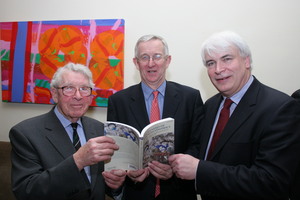
Pictured on Friday 27th February at the launch of Antoin E. Murphy's new book The Genesis of Macroeconomics in Trinity College are Professor Louden Ryan, former governor of the Bank of Ireland, Professor Antoin E. Murphy, Department of Economics, Trinity College Dublin and Ken O'Brien, Editor, FINANCE Magazine (click to enlarge)
'Quoting Murphy, Ferguson identifies Law's scheme in France as one of the first examples of monetary reflation, using paper money, all of which worked well at first, but ultimately resulted in what Ferguson describes as the first bubble, because he, Law, had no clear idea where to stop. What had to be stopped, or perhaps curbed, was Law's system, described by Murphy in his book as “a chain of ideas which support one another, and display more and more the principle they flow from”', O'Brien said.
'The French economy fell back into torpor, and Frenchmen did not trust securities, let alone paper money for generations after.
Let's hope that the aftermath of our present day bubble will see us avoid that outcome; and that's a task we will have to work at.' he said.
'The history of economic thought and the genesis of macroeconomic and monetary ideas has always distinguished Antoin's work as a macro economist, he continued.
“Professor Murphy's work, and that of his fellow historians of economic thought, and indeed economic historians, such as Professor O'Grada, is there to overcome “provincialism in time” : Nowadays, more than at any time in the past century we need to study the lessons of the past, because, although our present economic crisis has many unique features, it also has many features of past crises too”, he continued.
“I'd also like to say that I am delighted to see Professor Louden Ryan with us this evening.
“Professor Ryan's role as a formative influence with TK Whitaker in the crafting of the first and Second Programmes of Economic Expansion I always felt was underreported, and I think that economic historians of the future will be well served to examine carefully what he and Whitaker did.
“As one of his former students, I had the benefit of learning from him what a demand curve was, and why it was a curve and not just a straight line.
“And that's another lesson from economic thought, and economic history, a lesson that should not be lost in the rush to find remedies to Ireland's present economic crisis” .
Retro Macro: Antoin Murphy’s The Genesis of Macroeconomics
Introducing the book, Professor Cormac O'Grada of UCD said: 'It is thoughtful of Antoin Murphy and of Ken O’Brien to give us an excuse to be cheerful, at least for a few hours. But it is only natural, given the times we are in, to begin with some depressing news. And that news is that macroeconomics is dead. So why do we need a book about some dead practitioners of a dead subject?
A few years ago, when Ben Bernanke’s appointment was ushered through the US Senate with hardly a murmur, Michael Evans - author of a once widely-used textbook called Macroeconomic Activity - quipped, ‘Macroeconomics, unless it messes up, doesn’t matter very much any more’. Actually, reports of the demise of macroeconomics go back further, and were popular in the 1980s and 1990s with those who believed any kind of tinkering with the economy was wrong in the first place. Such claims were predicated on the kind of crisis we find ourselves in today being utterly inconceivable.
'Luckily for Antoin’s book, if for nothing else, macro is back. We need it again today, big-time. One only has to mention the popularity of the website irisheconomy.ie (which has had nearly 50,000 visits since its inception), the huge buzz surrounding the UCD-sponsored macro-crisis conference in early January, and the high profile gained recently by our own leading academic macroeconomists. What passed for a kind of ‘buy-buy-buy’, ‘it is going to be a soft landing’ macro associated with friends of the banks has been replaced by the musings of Morgan Kelly, Alan Ahearne, Philip Lane, Patrick Honohan - and Antoin Murphy. Academic macro is back in fashion.
'Antoin’s book is called The Genesis of Macroeconomics. Modern macroeconomics as we know it - or used to know it - was born in an economic climate rather like the present. As Antoin notes, the term ‘macroeconomics’ was coined by Ragnar Frisch in 1933. Frisch also invented the term ‘econometrics’, by the way, and some other terms that never caught on. But the term ‘macroecomomics’ or variants of it caught on very slowly. Keynes did not use in the General Theory, and one gets a sense that he did not like it; a check on JSTOR (the main scholarly journal archive) reveals only one paper - by Jan Tinbergen, and in French - using it before 1940. By 1950 there were 68 ‘hits’, by 1960 nearly 500, by 1970 over 7,000. ‘Macroeconomics’ was still unfamiliar enough in 1945 for an article in the American Economic Review to use it with the ‘macro’ bit in inverted commas.
'Whether Keynesian macro achieved as much as its defenders claimed is still disputed by economic historians. But what is important about Antoin’s book is its message that [a] macroeconomic thinking really goes back to the very dawn of analytical economics and [b] that much of that thinking was very sound.
'Admittedly, macroeconomics was born in sin. Mercantilism, the earliest version of macro, was fallacious and mendacious. It claimed that high wages were bad and low wages good, that trade was a zero-sum game, and the monarch, like the individual household, should concentrate on accumulating gold.
'That was macro before the creation. If Keynes, Friedman and the rest were New Testament prophets, Antoin’s book - as its title indicates - is about those who wrote the Book of Genesis.
'There are different ways of skinning the cat that is the history of ideas. In the realm of economics, one is that adopted by Sraffa, Pasinetti, Hicks, Steedman and others: dress old ideas up in new clothes. ‘Romeo and Juliet’ as ‘West Side Story’, if you like.
'This sometimes really works well. So if you are put off by the tedious verbosity of Francois Quesnay - as Voltaire famously was - you may be reassured by Walter Eltis’s brilliant mathematical reading of what made Quesnay tick. But sometimes the new clothes don’t fit or else give a distorted sense of the body underneath.
'The alternative is to go the retro route, deep into the historical context in which the ideas were first developed. This is very much Antoin’s strategy and it works very well. Happily for many students - and this book will go down a treat in with undergraduates and general readers alike -there are no hard sums here.
'Each chapter begins with a episode like ‘Imagine we are in France in 1758, in the magnificent chateau of Louis XV at Versailles’, or (my favourite) ‘Let us imagine that we are on Bloomsbury Heath in London in 1694. Dawn is breaking and two carriages appear out of the darkness…There is a flash of metal against the rising sun as blades are tested’’. And there follows some resonant episode from the life of the relevant economist (of whom there are eight in all). In the process, we attend a fatal duel in London, gamble a gold coin at the Ridotto in Venice, vicariously make and lose more money during the South Sea Bubble, treat the illnesses real or imagined of Louis XIV’s consort, get killed, and much more.
'Who thought economists were boring? But as those who have read his intellectual biographies of Law and Cantillon already know, Antoin doesn’t do boring in his writing. But the fun Antoin has with his Big Eight is a rhetorical device, it is the sugar coating. At the risk of embarrassing the author, I would say that if in analytical terms he is in the tradition of an Eltis, a Stigler, or a Blaug, in style and brio he is a match anyday for John Kenneth Galbraith or Charles Kindleberger.
'Several of those who feature in this book either were economic policy-makers themselves (Jacques Turgot, John Law, Henry Thornton), influenced policy in the short run (Adam Smith, William Petty, Francois Quesnay), or else benefited greatly from it (Cantillon, William Petty). They were well qualified to write about how the economy worked.
'Between them they came up with fundamental ideas such as the specie flow mechanism, national income accounting, the Law of one Price and market equilibrium, the circular flow of income, the invisible hand, free banking, the causes of inflation, the case for free markets in credit, moral hazard and the lender of last resort, and liquidity preference and the demand for money. And much more: read the book! I cannot think of a more convivial introduction to the logic and intuition behind these erudite concepts.
'Antoin’s Big Eight did their economic thinking in their spare time for the most part. Indeed how many were fully-fledged economists at all is a moot point. For most of them, there were more important and interesting things going on, and (in some cases) money to be made. The exceptions would be those two dour Scots in Antoin’s book, David Hume and Adam Smith - John Law, the other Scot, being a different animal entirely.
'Adam Smith once famously confessed to being a ‘beau in nothing but my books’, while a youthful David Hume had ‘an insurmountable aversion to everything but the pursuits of philosophy and general learning’. After a precocious education at the university in Edinburgh Hume confided to a friend, ‘there is nothing to be learned from a professor, which is not to be met with in books’.
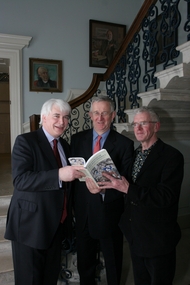
(l-r) Ken O'Brien, editor FINANCE Magazine, Professor Antoin Murphy, Triniy College Dublin and Professor Cormac O'Grada, UCD pictured at the launch of Antoin Murphy's new book The Genesis of Macroeconomics. (click to enlarge)
'Antoin’s other pioneering macroeconomists are more colourful characters. Two were medical men (Quesnay and Petty), three were wheeler dealers (John Law, Petty, and that cute Kerryman, Richard Cantillon), and one a career civil servant turned politician (Turgot). Henry Thornton was a banker, but a sober and upright one. Irish bankers, please copy!
'Had Antoin been able to invite his chosen eight macroeconomists here tonight, Smith, Hume, and Thornton might have looked for excuses not to come, while Cantillon and Law and Petty might be outside the room making shady deals.
'All these gentlemen found time to think and write, but they did not write a lot on average. Reassuringly for some of us, a few hit their creative high point quite late in life. Quesnay was 62 when he took up economics, while Smith was 53 when the Wealth of Nations appeared.
'Are there messages in their work for today’s policy-makers and commentators? Not too many, perhaps. The public sector was tiny then compared to today. But one of Jacques Turgot’s mantras while in charge of France’s finances in 1774 was ‘no bankruptcy, no tax increases, no borrowing’. If only! Minister Lenihan might not want to hear that the failure of Turgot’s successors to bring France’s finances into order would contribute in no small way in due course to the French Revolution.
'Turgot paid the price for unpopular policies himself, as did John Law. Adam Smith understood the political constraints that hindered trade liberalization. Others, especially Sir William Petty, was less hidebound by political constraints. Petty’s pioneering exercise in cost-benefit analysis -dating from the 1660s- involved reducing the population of Ireland from, as he reckoned, 1.2 million to 0.2 million, without bothering to ask them whether they might be interested.
'Three of Antoin’s heroes were entrepreneurial wide boys. Petty was opportunistic and rapacious, and Cantillon not averse to sharp practice either. Adam Smith was a saint by comparison. It is not emphasized enough that Smith, the champion of capitalism, did not trust businessmen. In today’s Ireland he would surely see the need for sackcloth and ashes all round, but he would have no time for guff from IBEC or Tom Parlon.
‘Our merchants and master-manufacturers’, he wrote in a passage that has lost none of its resonance, ‘complain much of the bad effects of high wages in raising the price and thereby lessening the sale of their good ... They say nothing concerning the bad effects of high profits. They are silent with regard to the pernicious effects of their own gains. They complain only of those of other people.’
'Smith relied on competition to keep businessmen honest. Today, at least in those sectors where crony capitalism rules, competition is not enough. How much regulation is needed? Who will regulate the regulators? How do we get out of the deep hole we are in? We had better find out soon. There can be no doubt but that Cantillon and Smith’s insights are consistent with the need for more regulation, albeit enlightened regulation, today than in his own day.
'Economist Alfred Marshall used to quip, faux-deprecatingly, ‘It is all in Adam Smith’. Marshall was wrong, but right in the sense that we lose out when we don’t consult the founding fathers of economics from time to time. Antoin makes an absolutely convincing case for the intelligence and originality of his Big Eight. True, although a few of them had to deal with - or, some would say, caused -economic crises, on the whole, they were more interested in how the economy grew - or how to make it grow - than in how to smoothen out fluctuations caused by exogenous shocks. They will continue to be read for their insights, and so I congratulate Antoin Murphy and commend his learned and timely book to you.
Professor Cormac O'Grada, UCD
A great part of macroeconomics had been discovered in the 17th, 18th and 19th centuries
Prof Murphy said: 'Thank you for your presence here this evening. In particular I wish to thank Ken O’Brien and his wife Valerie, along with Martina Bermingham from Ken’s company Fintel Publications, for hosting this evening. Ken, a highly successful publisher, was one of my first students in a class that also included our great friend, the late Paul Tansey. We miss Paul and his sensible advice so much in these troubled times. I am delighted that his wife, Olivia, and his daughter, Emily, are with us this evening. I am most grateful that Ireland’s leading economic historian Cormac O Grada has come here this evening to help launch this book.
' I was recently at the NCH and heard Verdi’s overture from La Forza del Destino. Identifying the music I said to myself that it was the theme music from the film Il Postino. My befuddled brain posed the question as to how Verdi had been able to copy the music from Il Postino. Had Verdi seen the film? Of course not. It was the other way around as yet another film maker cherry picked from the scores of the great composers. In this book I attempt to show how this has also been the case in macroeconomics. Certain macroeconomists nowadays think that macroeconomics is a subject that they have just recently discovered. This book tries to show that the roots go far deeper and that a great part of macroeconomics had been discovered in the 17th, 18th and 19th centuries long before the term was officially coined by Ragnar Frisch in the 1930s.
'I was catalysed into finishing this book, when, a number of years ago, a younger colleague informed me ‘you do not do macroeconomics’. My reply was that I did not do his type of highly mathematical macroeconomics, but, I do believe in a macroeconomics that has a solid intuitive base and one that can be explained to the public at large. Unfortunately, macroeconomics provides very few solutions to the current financial crisis. There is no John Maynard Keynes around with The General Theory of Employment, Interest and Money to explain exactly what is happening. Indeed, I believe that many of the younger macroeconomists have now become born again Keynesians.
'But even Keynes had his predecesssors, many of whom he failed to acknowledge. Sir William Petty, the only economic writer to have resuscitated a young lady supposedly executed on the gallows, was recommending the building of pyramids in 17th century England as a method of reducing unemployment – long before Keynes advocated similar policies. Incidentally, his descendant the Marquis of Lansdowne was responsible for the name of our national rugby stadium. Perhaps it should revert to the original family name, Petty, and be called the Petty Stadium in deference to its smaller size relative to Croke Park!
'John Law, a convicted Scottish murderer, an escapee from justice who became prime minister of France and caused the world’s first stock market boom and collapse was very much a pre-Keynesian in his efforts to increase the money supply and lower interest rates in France. Richard Cantillon, the Kerry born economic author, wrote the greatest analytical work in economics of the 18th century in order to show how John Law had grafted an excessive financial sector on to the real sector of the economy thereby causing the financial markets to collapse. Cantillon used his economic theories to become a multi-millionaire, but, alas, appears to have been murdered by his French chef in 1734 in Albemarle Street, London. The moral appears to be that if you become very wealthy be careful in your choice of French chefs!
'Francois Quesnay, the doctor of Madame de Pompadour Louis XV’s mistress, arrange for Louis XV to type out on his new printing press the first diagrammatic representation of the circular flow of income, the famous Tableau Economique in 1758.
'David Hume for all his brilliance in presenting the classical theory of money, wrote that if a wave destroyed the London Stock Exchange (Exchange Alley at the time) there would be no losses to the British economy except for the producers of quills and coffee. Many shocked investors probably now wish that a Humean wave had hit the stock exchange earlier this decade. Adam Smith believed that publicly quoted companies should be limited to just four sectors of the economy (1) banking (2) insurance (3) canals and (4) urban water supplies - a strange assessment for the man credited as the intellectual father of capitalism.
'Turgot, a remarkable French economist, and, like Law, a prime minister of France, was the first to introduce the concept of capital into economic analysis. Henry Thornton, who along with Lord Wilberforce, was responsible for the Parliament abolishing the slave trade in Great Britain showed the need for the Bank of England to act as a lender of last resort to prevent the British economy from moving into a deflationary spiral.
'These economists discovered the basic template of macroeconomics but they were also fascinating individuals. Hopefully the book shows this.
'I would like to give you one quotation - not mine - from the book:
War, famine, and pestilence, used formerly to fill up the number of the general calamities of mankind; but in the present age, one has been added, viz. bankruptcy. This year will ever be remembered as a year of confusion, dismay and distress. All the country has been shaken by a kind of commercial earthquake, while, like a company connected by an electrical wire, the people in every corner of the country have almost instantaneously received the same shock. (Boswell, 1772).
'Sounds familiar to the Ireland of 2009, however, the quotation refers to Scotland in 1772 after the collapse of the Ayr Bank, a collapse that greatly influenced Adam Smith’s monetary theory. Scotland recovered from that collapse and went on to feature significantly in the Industrial Revolution. Let us hope that we may sort ourselves out similarly.
'Unfortunately, I cannot offer a copy for everyone in the audience. What I can say is that my two earlier books published by Oxford University Press on Richard Cantillon and John Law are now apparently selling at a premium to their original price on Amazon. It is good to think that books may outperform shares.

